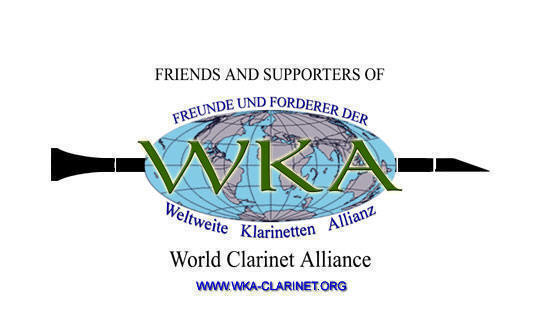
Click over Logo to Home Page
September 2019 Hot News
24 - 29 September 2019
Janecek International Clarinet Competition
Brno, Czech Republic
28 September 2019
VIP Sabine Grofmeier performs Mozart Clarinet Concerto K622 with the Neue Philharmonie Hamburg
Hamburg, Germany -
22 - 26 September 2019
III Monterrey Clarinet Festival
Monterrey, Mexico
14 - 25 September 2019
Marco Antonio Mazzini (Lima, Peru) Concerts and Master Classes in Russia
Moscow, Russia
20 September 2019
Cleveland Institute of Music Orchestra Concert, Melisse Brunet, Conductor with Competition winner Shihao Hugh Zhu, clarinet, student of Senior VIP Franklin Cohen - student artist performing Copland Clarinet Concerto
Cleveland, Ohio USA
There wias a live broadcast on WCLV 104.9 FM and wclv.org with support from Audio-Technica. Mélisse Brunet’s appearance is made possible by the Kulas Visiting Artist Series funded by the Kulas Foundation.
Explore the full program.
15 September 2019
BlueWater Chamber Orchestra and Amitai Vardi - Acclaimed Orchestral Principal in many past Orchestras and Professor at Kent State University - performs Solo work The Klezmer's Wedding by Canadian Composer Srul Irving Glick
Cleveland, Ohio USA
by
September 15, the BlueWater Chamber Orchestra, under conductor and artistic director Daniel Meyer, opened its season with an imaginatively varied concert at The Temple-Tifereth Israel. Amitai Vardi was featured in Srul Irving Glick’s The Klezmer’s Wedding, a delightful one-movement piece for clarinet and string orchestra.
Vardi and concertmaster Emily Cornelius had some sparkling exchanges early on, supported by short comments from principal cello Kent Collier and the rest of the orchestra. The violas accompanied beautifully, leading to principal second Callista Koh’s charming solo. Meyer maintained a crisp flow.
The Jewish cantorial mode, Ahava Raba, predominated, with its lowered second followed by a raised third. Charming syncopated lines, off-beat eighth-note accompaniment, cross-rhythmic triplets, parallel thirds in the violins, and mixed duple and triple groupings helped build up excitement.
Vardi soared throughout the range of the clarinet, alternating raucous and syrupy sounds. The final lively and tuneful section increased tempo as Vardi and the Orchestra raced to a rousing close.
In sharp contrast was Norman Dello Joio’s Meditations on Ecclesiastes, a theme and eleven variations loosely based on the famous Biblical text beginning with “To everything there is a season.” Kathryn Wolfe Sebo, cantor at the Temple, added luster by first singing the entire Hebrew text in beautiful cantorial style. She also recited the English text between variations.
The theme included piquant dissonant counterpoint, and tremolo figures accompanying a portentous solo by Cornelius. She joined Collier in playing scintillating tremolos against the ensemble in “a time to embrace.”
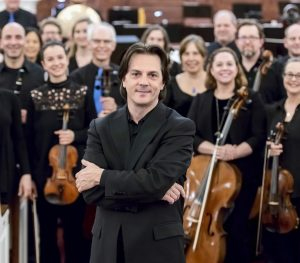 Turbulent
violin entrances portrayed “a time of hate, and of war.” Collier’s colorful solo
on “a time to love, and of peace” led to glorious major chords from the full
ensemble, and a tranquil ending. Meyer conducted with a sense of balance and
precision.
Turbulent
violin entrances portrayed “a time of hate, and of war.” Collier’s colorful solo
on “a time to love, and of peace” led to glorious major chords from the full
ensemble, and a tranquil ending. Meyer conducted with a sense of balance and
precision.
In 1874 the 33-year old Antonin Dvořák won the prestigious Austrian State Prize for composition after submitting more than a dozen works. The substantial grant saved him from the threat of poverty. He celebrated this and the birth of his first son by composing the Serenade for Strings in two weeks.
Meyer and the Orchestra presented an engaging performance of that classic. The tuneful and dancelike “Moderato” led to a charming “Tempo di Valse.” The “Scherzo” was highlighted by Koh’s substantial solo against rapid 16th-notes.
After the flowing tranquility of the “Larghetto,” which includes quotations from the second movement, the “Finale” begins with a rustic dance. Violins and cellos exchanged graceful lines against an 8th-note background in the second theme. Following the sparkling 16th notes in the third, the slower Larghetto theme returned. A scintillating Presto coda closed the gorgeous performance.
15 September 2019
VIP Sabine Grofmeier Hamburger Serenade Chamber Concert
Hamburg, Germany
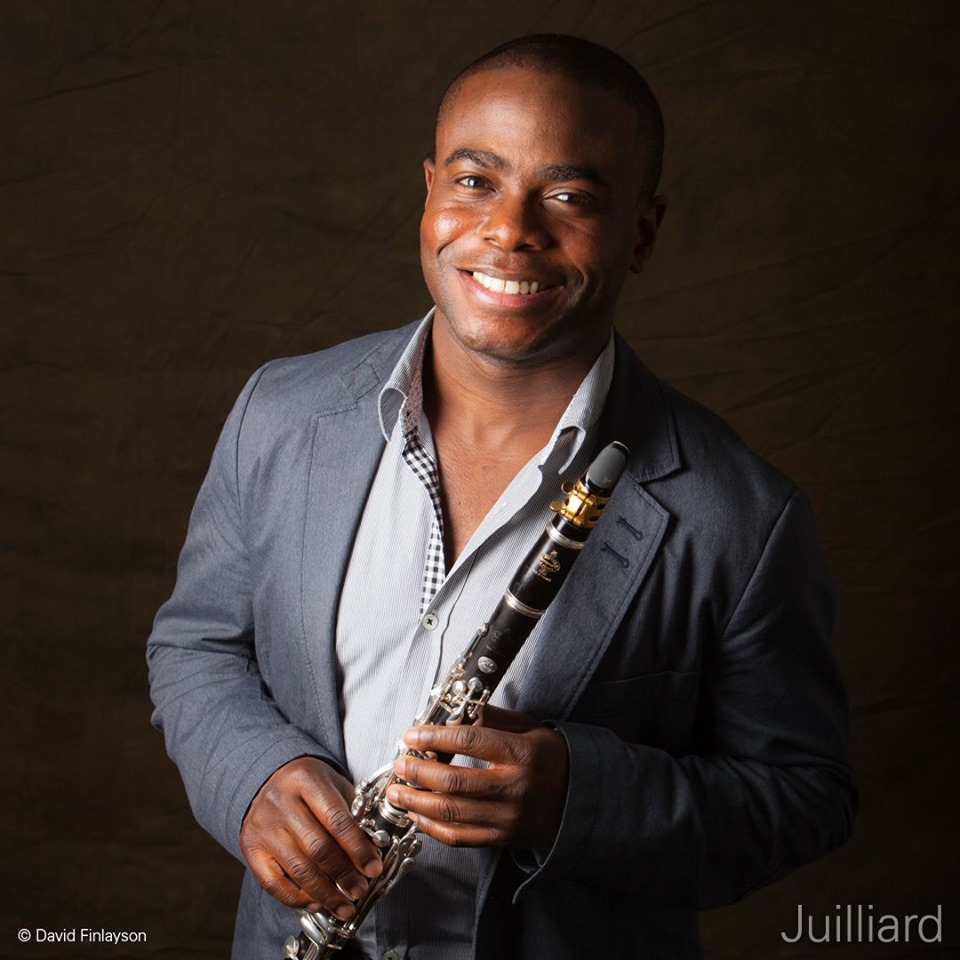
12 September 2019
New York Philharmonic principal clarinet and Juilliard faculty member Anthony McGill has been named artistic director of The Juilliard School's Music Advancement Program!
New York City USA
Juilliard has named clarinetist Anthony McGill, as artistic director of the school’s Music Advancement Program (MAP). McGill, who is principal clarinet of the New York Philharmonic, has been the artistic advisor to the MAP program since 2017, and a Juilliard college division faculty member since 2011. In this new expanded role, McGill will work closely with Weston Sprott, who began as dean of Juilliard’s preparatory division in May 2019.
McGill will maintain his position on the college clarinet faculty and continue his artistic career as principal clarinet of the New York Philharmonic, as a soloist and as a chamber musician, in addition to his ongoing teaching within MAP.
Juilliard’s MAP program serves students from ages 8 to 17 from New York City’s five boroughs and the tristate area. The program seeks students from diverse backgrounds underrepresented in the classical music field. Together, MAP and Juilliard Pre-College now make up the school’s preparatory division, which strengthens the relationship between the programs and builds a comprehensive approach to youth education at Juilliard.
“I’m excited to work more closely with Weston and the rest of the MAP faculty in service of our students,” McGill said. “Having access to excellent music training early in my life played a critical role in where I am today, and I look forward to teaching and mentoring the next generation of musicians.” McGill, who grew up on the South Side of Chicago, received his early musical training from the Merit School of Music in Chicago and is a graduate of Curtis Institute.
“As we work to build on the extraordinary history of the preparatory division, it is thrilling to welcome Anthony in this new expanded role,” said Juilliard President Damian Woetzel. “A consummate artist and educator, Anthony will be a visionary leader for our Music Advancement Program.”
“Anthony has been a much valued member of Juilliard’s college division faculty,” said Ara Guzelimian, provost and dean. “He is a gifted musician, esteemed educator, and thought leader in the music world, and we look forward to having him as MAP’s artistic director.”
“Anthony’s impeccable artistry and deep commitment to the mission of MAP are a uniquely valuable combination,” said Weston Sprott, preparatory division dean. “Juilliard is incredibly fortunate to have him take on this new and expanded role, and I look forward to partnering with Anthony and Rebecca Reuter, MAP’s administrative director, to build on the great work of the program.”
The cornerstones of Juilliard Preparatory Education Division are two Saturday music programs. The Music Advancement Program offers intermediate students with great musical potential a comprehensive curriculum, performance opportunities, and summer study partnerships that allow them to pursue advanced music studies while developing their talents as artists, leaders, and global citizens. Juilliard Pre-College, which celebrated its centennial last season, offers a comprehensive conservatory-style music program for students ages 8 to 18 who exhibit the talent, potential, and ambition to pursue music study at the college level.
About Anthony McGill
Anthony McGill was named principal clarinet of the New York Philharmonic in 2014, having previously served as principal clarinet of the Metropolitan Opera Orchestra and associate principal of the Cincinnati Symphony Orchestra. Among the orchestras with which McGill has appeared as soloist are the Metropolitan Orchestra and the Baltimore, Kansas City, and New Jersey orchestras. He has recorded the Nielsen Concerto and Copland Concerto with the New York Philharmonic. As a chamber musician he has performed throughout the U.S., Europe, Asia, and South Africa. His festival appearances include Tanglewood, Marlboro, and Santa Fe, among many others. McGill performed with Itzhak Perlman, Yo-Yo Ma, and Gabriela Montero at the inauguration of President Obama in 2009, and he is a founding member of the McGill/McHale Trio with flutist Demarre McGill and pianist Michael McHale. He was the 2015-16 WQXR artist in residence and received the John Jay Justice Award in 2016. A graduate of the Curtis Institute of Music, McGill serves on the faculty of Juilliard, Curtis Institute, and Bard College Conservatory.
About Juilliard’s Preparatory Division, led by Dean Weston Sprott
The Music Advancement Program (MAP) is a Saturday instrument instruction program for intermediate students from New York City’s five boroughs and the tristate area who exhibit great musical potential. The program actively seeks students from diverse backgrounds underrepresented in the classical music field and is committed to enrolling the most talented and deserving students regardless of their financial background. Through a comprehensive curriculum, performance opportunities, and summer study partnerships, MAP students gain the necessary skills to pursue advanced music studies while developing their talents as artists, leaders, and global citizens. Approximately 70 students are enrolled in MAP, which is led by Artistic Director Anthony McGill and is generously supported through an endowed gift in memory of Carl K. Heyman.
One of the foremost music preparatory programs in the world, Juilliard Pre-College educates today’s most promising artists. Pre-College at Juilliard offers a complete curriculum of music instruction for highly gifted children up to age 18. Students attend Juilliard every Saturday for 30 weeks during the school year for an individualized course of instruction carefully designed to meet their particular needs. The selective program includes instruction in a chosen major, academic study of music, and solo and ensemble performances. Recognizing the importance of early development and discipline in the music field, the program provides a caring, collaborative, and challenging atmosphere where artistic gifts and technical skills can flourish. Approximately 300 students are enrolled in Pre-College, which is led by Artistic Director Yoheved Kaplinsky.
About The Juilliard School
Founded in 1905, The Juilliard School is a world leader in performing arts education. Juilliard’s mission is to provide the highest caliber of artistic education for gifted musicians, dancers, and actors from around the world so that they may achieve their fullest potential as artists, leaders, and global citizens.
Located at Lincoln Center in New York City, Juilliard offers undergraduate and graduate degrees in dance, drama (acting and playwriting), and music (classical, jazz, historical performance, and vocal arts). Currently more than 800 artists from 40 states and 41 countries are enrolled at Juilliard, where they appear in more than 700 annual performances in the school’s five theaters; at Lincoln Center’s Alice Tully and David Geffen halls and at Carnegie Hall; as well as other venues around New York City, the country, and the world. Beyond its New York campus, Juilliard is defining new directions in global performing arts education for a range of learners and enthusiasts through The Tianjin Juilliard School and K-12 educational curricula.
8 September 2019
Steel City Clarinet Day
-
Dr. Amanda Morrison
\
Indiana, Pennsylvania USA
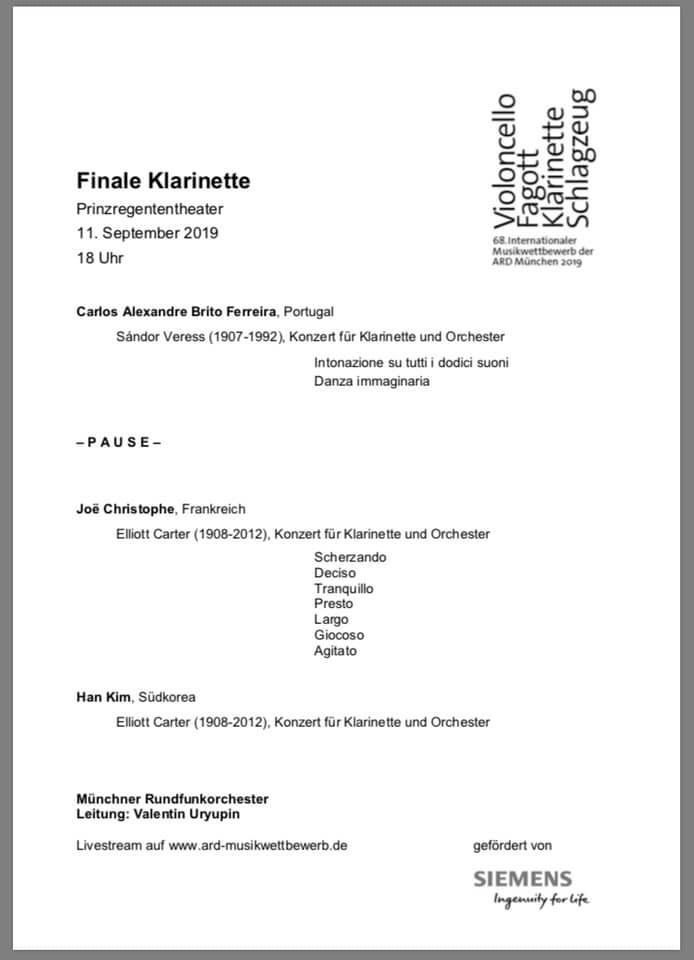
2 - 11 September 2019
ARD International Clarinet Competition at the Bavarian Rundfunk
Munich, Germany
Congratulations to the prize winners of the 68th ARD International Music Competition in the category - clarinet 💐
1st prize:
Joë Christophe
🇫🇷-
Prize
for the comissioned piece: Joë Christophe
🇫🇷
2nd prize:
Han Kim
🇰🇷
and Carlos Brito Ferreira
Audience
Award:
Han Kim
Im ersten Finale des diesjährigen ARD-Musikwettbewerbs gab die Jury am Mittwochabend eine historische Entscheidung im Fach Klarinette bekannt: Neben einem ersten Preis wurden auch zwei zweite Preise vergeben. Die Jury unter dem Vorsitz von Charles Neidich verkündete damit das beste Ergebnis für das Fach Klarinette in der 68-jährigen Geschichte des Wettbewerbs.
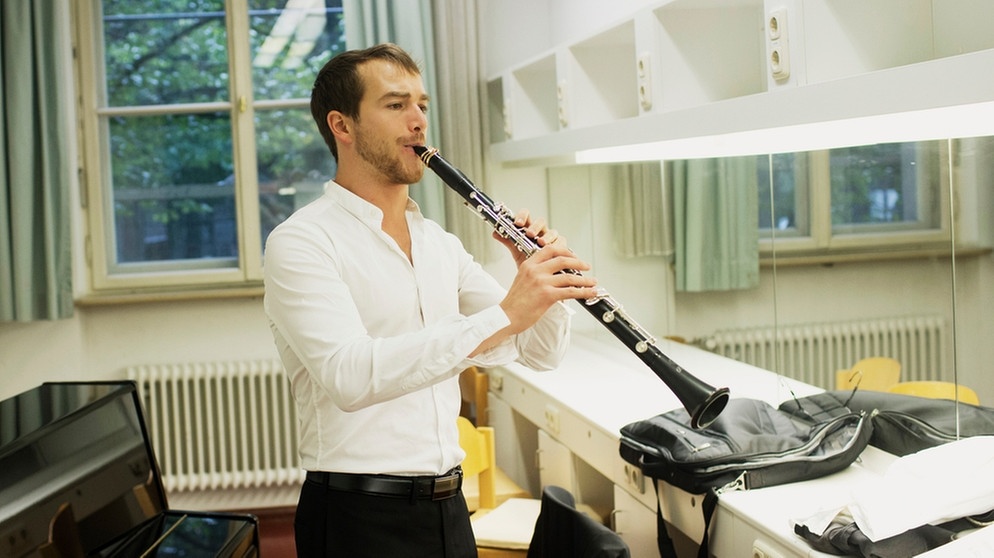
Bildquelle: Daniel Delang
Der mit 10.000 Euro dotierte erste Preis wurde an Joë Christophe aus Frankreich vergeben. Er hatte die Juroren mit seiner Interpretation von Elliott Carters Klarinettenkonzert überzeugt. Außerdem erhielt er den Sonderpreis für die beste Interpretation der Auftragskomposition von Mark Simpsons „Three pieces for clarinet“.
Die anderen beiden Finalisten, Carlos Alexandre Brito Ferreira aus Portugal und Han Kim aus Südkorea, bekamen jeweils einen mit 7.500 Euro dotierten zweiten Preis. „Das Ergebnis spiegelt das sehr, sehr hohe Niveau in diesem Wettbewerb wider“, sagte Jurorin Nina Janßen-Deinzer nach der Verkündung. Han Kim wurde zudem mit dem Publikumspreis in Höhe von 1.500 Euro ausgezeichnet. Er hatte sich ebenfalls für das Konzert von Elliott Carter entschieden. Carlos Alexandre Brito Ferreira wählte als einziger Sandor Veress‘ Klarinettenkonzert für den Finalauftritt. Begleitet wurden die drei Musiker vom Münchner Rundfunkorchester unter Leitung von Valentin Uryupin.
Wie alle Preisträger beim ARD-Musikwettbewerb sind auch Joë Christophe, Carlos Alexandre Brito Ferreira und Han Kim in den Preisträgerkonzerten am 18., 19. und 20. September zu hören. BR-KLASSIK überträgt alle Konzerte live im Radio und als Videostream auf brklassik.de.
How it all began…
It took place for the first time in 1952: the ARD International Music Competition, one of the most renowned and large-scale competitions of its kind. It was founded by the public broadcasting radio stations of the Federal Republic of Germany, managed by Bavarian Broadcasting in Munich and takes place every year in September. For many of today’s world-famous artists, an award from the ARD International Music Competition in Munich represented a spring board to their major careers: Jessye Norman, Franklin Cohen, Francisco Araiza, Natalia Gutman, Christoph Eschenbach, Mitsuko Uchida, Thomas Quasthoff, Yuri Bashmet, Christian Tetzlaff, Sharon Kam,Heinz Holliger, Peter Sadlo, Maurice André and the Quatuor Ebène, to name but a few.
The Competition Today
Over the years, the ARD International Music Competition with its annually changing line-up of musicians has developed into an internationally singular and highly regarded institution. It offers not only singers and pianists but also all the other instrumentalists the podium of an international competition, both for solo and chamber music performance. Since 2001, the presence of contemporary music has been considerably reinforced through commissions to prominent composers.
Each year an average of 400 to 600 young musicians apply to take part in the competition. Then, following a preliminary round, some 200 competitors from 35 to 40 countries actually appear. The international renown of the ARD Music Competition can be noted by the high percentage of non-German participants (88 %).
The 68 th ARD International Music Competition Munich took place from September 2 to 20, 2019 in the categories Violoncello, Clarinet, Bassoon and Percussion. Application deadline was March 31, 2019.
All competitiors who reached the second round were provided with the cost of accommodation and meals from the second round on for the duration of their further participation in the audition process.
Concert managers, concert agencies and respresentatives of the music industry will be invited to the final rounds and the prize winners' concert.
Please click here for the ARD website and more information.
Vorauswahl
a) FERRUCCIO BUSONI, Concertino op. 48
b) IGOR STRAWINSKY, Drei Stücke für Klarinette solo
Erster Durchgang (20–25 Min.)
1. Eines der folgenden Werke:
ELLIOTT CARTER, Gra
BRUNO MANTOVANI, Bug
ARIBERT REIMANN, Solo für Klarinette
GIACINTO SCELSI, Preghiera per un’ombra
JÖRG WIDMANN, Fantasie
2. Eines der folgenden Konzerte:
BERNHARD CRUSELL, op. 5
FRANZ KROMMER, op. 36
SAVERIO MERCADANTE, op. 101
LOUIS SPOHR, Nr. 1 c-Moll op. 26
CARL STAMITZ, Nr. 3
CARL MARIA VON WEBER, op. 73
Zweiter Durchgang (max. 45 Min)
3. Eines der folgenden Werke:
JOHANNES BRAHMS, Sonate op. 120 Nr. 1 oder Nr. 2
MAX REGER, Sonate op. 49 Nr. 1 oder Nr. 2
4. Eines der folgenden Werke:
ALBAN BERG, Vier Stücke für Klarinette und Klavier op. 5
ERNEST CHAUSSON: Andante et Allegro
CLAUDE DEBUSSY, Rhapsodie für Klarinette und Klavier Nr. 1
BOHUSLAV MARTINŮ, Sonatina für Klarinette und Klavier
FRANCIS POULENC, Sonate für Klarinette und Klavier
5. MARK SIMPSON, Auftragskomposition des Internationalen Musikwettbewerbs der
ARD 2019, finanziert durch die Ernst von Siemens Musikstiftung.
Die Noten werden mit der Zulassung zum Wettbewerb zugesandt. Das Auftragswerk
darf von Noten gespielt werden, es darf vor dem Wettbewerb nicht öffentlich
aufgeführt werden.
Semifinale mit dem Münchener Kammerorchester
6. WOLFGANG AMADEUS MOZART
Konzert für Klarinette und Orchester KV 622
Finale mit dem Münchner Rundfunkorchester
7. Eines der folgenden Konzerte für
Klarinette und Orchester:
ELLIOTT CARTER
SÁNDOR VERESS
Auswendig vorzutragen sind die Werke aus den
Werkgruppen Nr. 2 und 6.
Copyright © 1999 WKA-Clarinet.org. All rights reserved.
Revised:
October 01, 2019